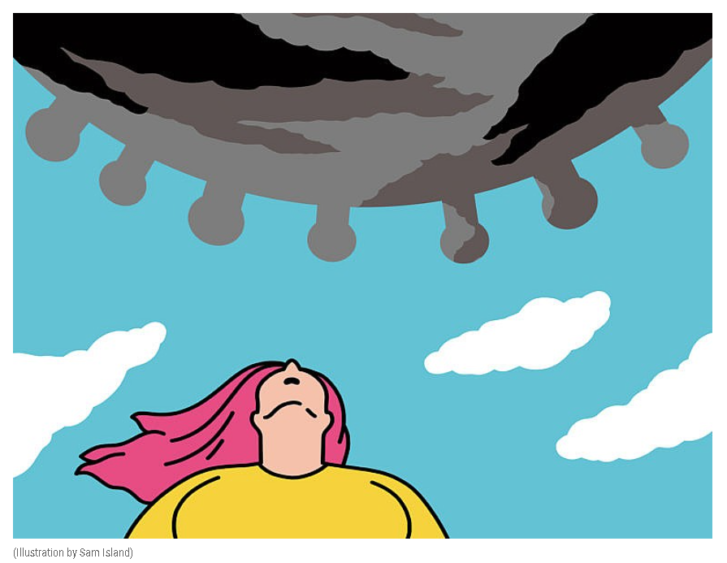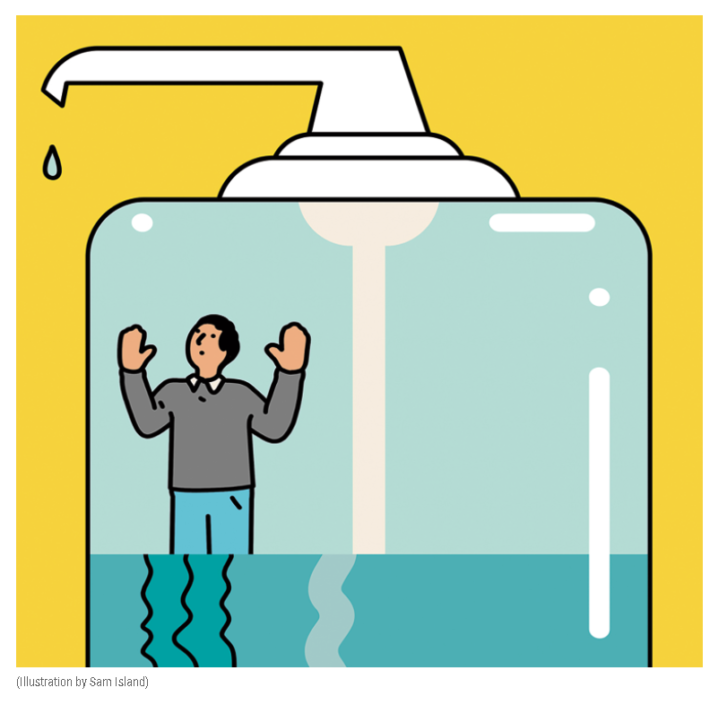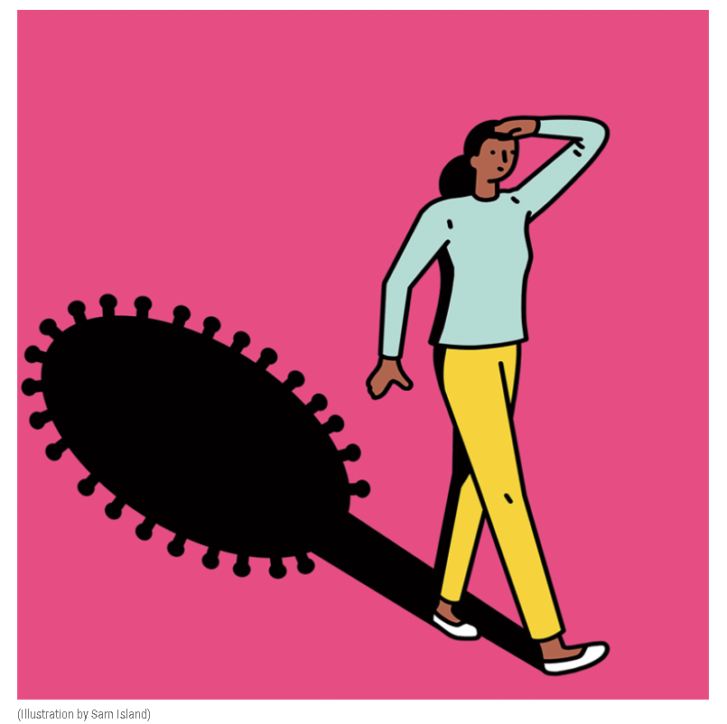Scientists are beginning to gauge how the last 18 months have changed us—for better and worse
There’s a giant container of hand sanitizer in the front entryway of Sam Maglio’s home. It’s oversized. It’s clunky. It doesn’t fit in.
“I want to get rid of that bucket of hand sanitizer as fast as possible,” says the University of Toronto marketing and psychology professor, who researches motivation, emotion and consumer behaviour. “My understanding right now is that hand sanitizer doesn’t matter that much.”

But his family hasn’t been able to do away with the receptacle that’s occupied precious indoor real estate for the better part of the last 18 months—and he’s sure he’s not the only one. “For some people that habit has taken on the form of almost a ritual,” he adds. “They know it’s not doing anything for them, but it makes them feel better.”
If history is any guide, Maglio need not worry about hand sanitizer occupying an important part of his post-pandemic life. People took their masks off fairly quickly after the 1918 pandemic, says UBC psychology professor Steven Taylor, author of the highly prophetic 2019 book The Psychology of Pandemics. “The tendency to engage in these protective behaviours—masks, hand washing, hand sanitizer—tends to drop off over time.”
Still, many of those who lived through the Great Depression remained steadfastly frugal throughout their lives—in preparation for, or perhaps in fear of, the next economic calamity—and scientists are starting to analyze the long-term physical and psychological impacts the COVID-19 pandemic may be having on brain function, consumer habits, grief processes and memory. “The pandemic offered people a hard reset from the way they used to live their lives,” Maglio says. “One very powerful way to change behaviour is when you have no other choice.”
Stress
A woman who turned 30 during the pandemic confided she felt as though she had lost the best two years of her life stuck in lockdown, always wearing a mask and barely socializing. Other young women looking to start families—seeking a partner or in vitro fertilization—told Barbara Sahakian, a professor of clinical neuropsychology at the University of Cambridge, about the stress of helplessly enduring the tick-tick-tick of their biological clocks, unable to find potential suitors amid lockdown or seek doctors able to perform fertility procedures.
Then there were those trapped in apartments with small children, trying to balance working from home while homeschooling. And then there were the overworked frontline health-care workers facing death daily, fearing for their patients, themselves and their own families.

Every story told was one of constant, almost never-ending stress. “I think the major factor [from this pandemic] will be chronic stress,” Sahakian says. “Because we know with chronically high cortisol [the primary stress hormone], there’s damage to areas of the brain, including the hippocampus, which is very important for our memories and for learning.”
The on-again, off-again lockdowns also impacted the brain. Last fall, Sahakian co-authored a study where participants were asked to test their emotion recognition, looking at both sad and happy faces; those in lockdown were worse at recognizing happy faces and better at recognizing sad faces, with results linked to how connected folks remained during the pandemic.
“It’s akin to what we see in depression,” Sahakian says. Some of it may be reversible, but “it might make you more vulnerable if you’re a healthy person. Perhaps under conditions of stress later on, you’ll begin to revert back to that negative way of looking at things.”
And then there’s the portion of the population who contracted COVID-19, recovered, and are now left to wonder what long-term impacts lie in store.
“Within the brain, we see actual lesions that typically would not exist in younger individuals—and they’re more common among those who’ve been sick with COVID-19,” says Teresa Liu-Ambrose, director of the aging, mobility and cognitive health lab at the University of British Columbia. “Even though they’re small, they have a significant impact on cognition and can increase the risk of people’s future cognitive status.” And it’s not only cognition; behaviour can be impacted. “Typically, they could have less inhibition, meaning they might be a little bit more impulsive,” Liu-Ambrose explains. “It would be reasonable to assume there might be behavioural changes that impact their day-to-day.”
Sahakian is most concerned about COVID’s effect on the hippocampus, “the first area of the brain to get the neuropathological changes that are seen in things like Alzheimer’s disease,” she says. “We may have increased the risk factor for Alzheimer’s disease by getting COVID-19. We don’t know yet. But that’s quite possible.”
Grief
Susan Cadell reads a lot of obituaries. There’s been one common final line over the past 18 months: a memorial for the deceased will be held at a later date.
“Mourning may be thwarted by lockdowns and an inability to gather. But the grief is not,” says the University of Waterloo professor, who studies bereavement. “People are still able to grieve because they are still able to feel.”
Some have found non-traditional ways to memorialize their loved one during the pandemic—Cadell points to an article in Chatelaine about how the simple act of making minestrone soup helped the author grieve her grandmother—but for others seeking to follow the usual protocols of funerals, gatherings and dropping off casseroles at front doors, “the worry is that, without the external rituals, we will just go deeply into sorrow, loneliness and isolation. And that’s where we get stuck [in grief].”
When you disrupt those rituals, you disrupt the normal grieving process, agrees Taylor, the Psychology of Pandemics author. “There’s going to be a lot of bereavement out there and that can become chronic. You can’t stop thinking about this person. You avoid places that remind you of the person. You have moments of intense grief and crying—almost panic-like episodes.”
A July 2020 study found that for every COVID death in the U.S., approximately nine close family members were left to grieve—such as parents, spouses, children or grandchildren. A more recent study found that one of every 13 COVID-19-related deaths in America left someone younger than 18 without a parent.
Prior to the pandemic, prolonged and complicated grief occurred in less than 10 per cent of individuals in bereavement. Now, a study co-authored by Cadell that surveyed francophone Canadians showed the incidence rate sits at about 15 per cent—a small, albeit statistically significant, increase.
Consumer behaviour
Pandemics have a way of drawing out extremes: at one end of the spectrum, the anti-vaccine, anti-mask, anti-lockdown protesters; at the other, the highly anxious who won’t step outside to socialize.
In the post-pandemic world, those extremes will likely apply to consumer behaviour, explains Taylor. Some will become more frugal, anticipating another economic depression, while others will become spendthrifts, embracing a YOLO lifestyle.
Despite massive job losses in 2020, Canadians with nowhere to spend their paycheques during lockdown amassed $212 billion in savings the first year of the pandemic—more than $5,000 per Canadian—compared to a relatively paltry $18 billion the year prior, which amounted to less than $500 a person.
As lockdowns ease further, the habits that helped bank accounts swell are likely to continue, says D’Arcy McDonald, Scotiabank’s senior vice-president of deposits, investments and payments. “Almost half of Canadians in a survey we ran through the spring told us they plan to maintain these positive savings habits,” he says. “They developed some muscle memory of saving more and spending less.”

Even if people start going on epic vacations and to sporting events again, McDonald says many are underestimating the value related to not commuting to work, which is likely to continue in some capacity for many Canadians. “This shift to virtual work—between the wardrobe, transit pass, lunch in a food court, maybe beer after work—is probably the most material driver of savings.”
There will be higher pent-up spending at restaurants, but likely only in the short term, according to a 2021 food consumer survey from Deloitte. Instead, the consulting firm expects the “rise of the epicurean,” or an increase in home-cooked meals.
Many are quick to joke about gaining a few pounds amid lockdown—the “COVID 15”—but 80 per cent of Canadians said they’re spending more on fresh produce and non-dairy substitutes, according to Deloitte, while 40 per cent reported spending less on dessert or ready-to-eat meals. Meanwhile, three-quarters of Canadians didn’t try a diet trend in 2020—and more than half said they probably won’t.
“There’s a bit of a perspective around food forming that is not about saying, ‘Hey, I’m on the X diet,’” says Marty Weintraub, who leads Deloitte’s national retail consulting practice for Canada.
Then there are those who bought a Peloton or rediscovered a nearby track. “If people learn this new habit, a routine of exercising at home—and then they notice they’re saving money along the way—they might say they can’t imagine going back to a gym, where people are huffing and puffing and sweating,” says Maglio, the University of Toronto professor. “I worry about the future for places like gyms.”
Unlike the Great Depression, where a generation of frugality was born of fear, McDonald says the mindset forged during the pandemic is instead a re-examination of spending priorities—and striking a better balance between spending and earnings.
What we’ll remember
Plagues are not new to our species: they exist in the Bible; they’re in the works of Shakespeare; Homer’s Iliad, one of the earliest surviving works of Western literature, begins with a plague.
“We had repositories of knowledge in our society, in our religions, in our literary traditions,” says Nicholas Christakis, a Yale sociologist. “We also had epidemiologists, medical historians, and scientific expertise about these topics. But the average person on the street did not have any practical experience with this and that’s why people continue to be surprised by things that really are not surprising.”
So, when asked how the pandemic will change us in 10 or 20 years, his answer is: “Not very much.”
That’s not to say there won’t be changes; Christakis expects some kind of “Roaring Twenties” behaviour to take shape in a few years. “People who’ve been cooped up for years will relentlessly seek out social interactions—in nightclubs, restaurants, bars, sporting events and political rallies,” he says. “This may feed into more political activism, musical concerts and so on.”
There will be some “sexual licentiousness,” Christakis continues, adding his sister reminded him to clarify this prediction doesn’t apply to married couples. He also says it won’t be a permanent shift. Nor will the rejuvenated enthusiasm for parties last forever. “Just like after the Roaring Twenties, the pendulum will swing back to a more normal equilibrium kind of social interaction.”
Surprisingly, some experts say by the time COVID-19 is in the rear-view mirror, the pandemic may not even be remembered as a defining chapter in many of our lives. “During the lockdown, people did nothing,” says University of Alberta psychology professor Norman Brown. “I mean, they did stuff, but it was highly repetitive and highly limited. It all kind of blended together.” As months passed in the pandemic, many couldn’t even remember what day of the week was—which led to the coining of the term “Blursday.”
“If you’re not doing anything interesting, you don’t lay down individual memories,” says Brown, whose ongoing research includes the possible effect of the pandemic on autobiographical memories.
That isn’t to say the COVID-19 pandemic won’t be remembered as a historically important event or that it hasn’t altered countless lives. “But if you’ve had a really traumatizing experience with COVID—stress, depression, grief, loneliness—it will really hurt your hippocampal and related memory centres,” says Natasha Rajah, a McGill University psychiatry professor who specializes in memory and the brain. “And so you’re going to have fewer vivid memories. You’re going to have a harder time remembering this period of your life.”
For the majority, Brown says this period will be remembered more as an “interlude”—that time when we couldn’t go to restaurants and there was the weird NHL season. “Except for the people who became seriously ill, who lost jobs, who lost businesses, who lost their spouses or children, it’s not gonna figure prominently in their life story.”
Instead, he says, we are more likely to remember some of the pandemic’s special qualities, like the masks, the quick shift to virtual meetings—and the hand sanitizer.
If history is any guide, we may well forget all about it by the time the next pandemic comes along.
Article From: Maclean’s
Author: Aaron Hutchins

